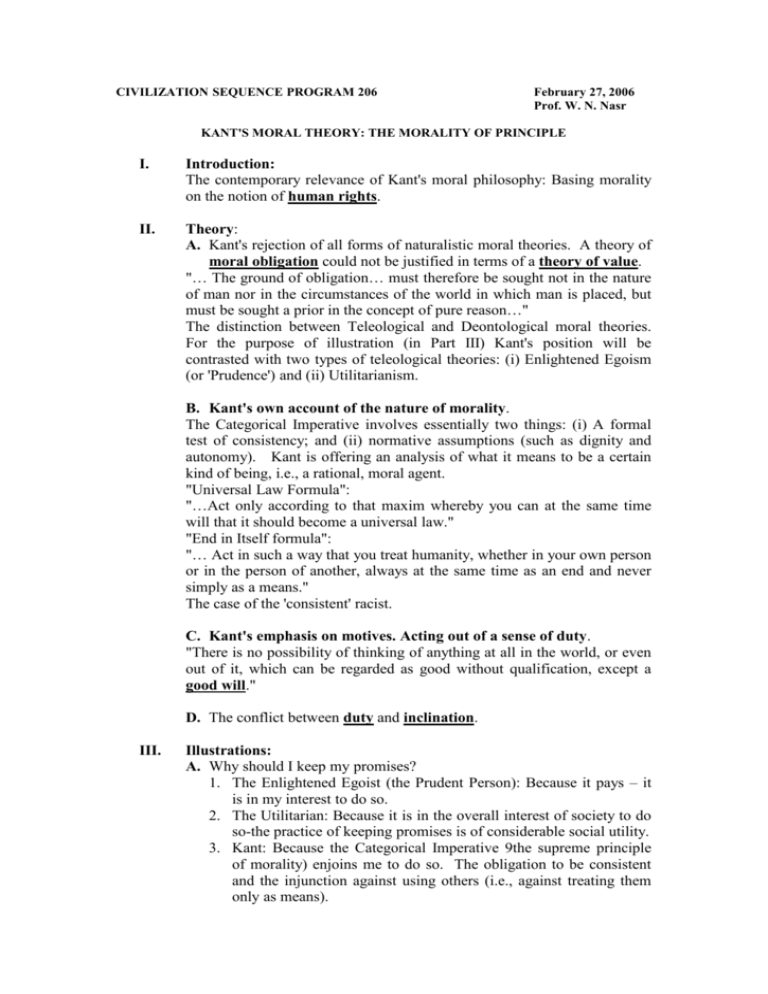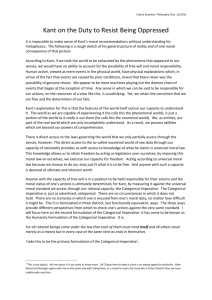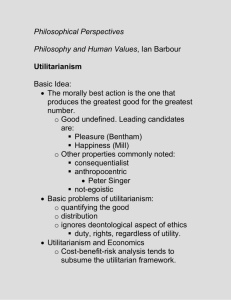CIVILIZATION SEQUENCE 203
advertisement

CIVILIZATION SEQUENCE PROGRAM 206 February 27, 2006 Prof. W. N. Nasr KANT'S MORAL THEORY: THE MORALITY OF PRINCIPLE I. Introduction: The contemporary relevance of Kant's moral philosophy: Basing morality on the notion of human rights. II. Theory: A. Kant's rejection of all forms of naturalistic moral theories. A theory of moral obligation could not be justified in terms of a theory of value. "… The ground of obligation… must therefore be sought not in the nature of man nor in the circumstances of the world in which man is placed, but must be sought a prior in the concept of pure reason…" The distinction between Teleological and Deontological moral theories. For the purpose of illustration (in Part III) Kant's position will be contrasted with two types of teleological theories: (i) Enlightened Egoism (or 'Prudence') and (ii) Utilitarianism. B. Kant's own account of the nature of morality. The Categorical Imperative involves essentially two things: (i) A formal test of consistency; and (ii) normative assumptions (such as dignity and autonomy). Kant is offering an analysis of what it means to be a certain kind of being, i.e., a rational, moral agent. "Universal Law Formula": "…Act only according to that maxim whereby you can at the same time will that it should become a universal law." "End in Itself formula": "… Act in such a way that you treat humanity, whether in your own person or in the person of another, always at the same time as an end and never simply as a means." The case of the 'consistent' racist. C. Kant's emphasis on motives. Acting out of a sense of duty. "There is no possibility of thinking of anything at all in the world, or even out of it, which can be regarded as good without qualification, except a good will." D. The conflict between duty and inclination. III. Illustrations: A. Why should I keep my promises? 1. The Enlightened Egoist (the Prudent Person): Because it pays – it is in my interest to do so. 2. The Utilitarian: Because it is in the overall interest of society to do so-the practice of keeping promises is of considerable social utility. 3. Kant: Because the Categorical Imperative 9the supreme principle of morality) enjoins me to do so. The obligation to be consistent and the injunction against using others (i.e., against treating them only as means). B. Why is it wrong to 'punish' a man whom we know to be innocent? (And why is it also wrong not to punish a man whom we know to be guilty?) 1. The Enlightened Egoist would oppose such punishment only out of fear that it may be done to him or that such actions could cause him some harm. 2. The Utilitarian may oppose such a practice because he considers it to be more harmful than beneficial to society at large. 3. Kant: considerations of how my interests, or the general interests of society, are affected have entirely no bearing on this matter. We have a right to punish a man only if it has been established that he committed a crime. C. Why do we value freedom? Why is slavery wrong? The Teleologist can oppose slavery only if he can show that it is detrimental to his interests (the Egoist) or the interests of society (the Utilitarian). The teleologist's defence of freedom or his rejection of slavery depends on certain empirical claims or considerations. What if Dostoevsky's Grand Inquisitor is right?! (The Grand Inquisitor believes that for the overwhelming majority of people freedom is a burden which they are too weak to carry. Hence it follows that by giving people freedom you contribute to their misery, not to their happiness. Notice that since this is a view about human nature or human psychology, the issue of whether it is true or false can be resolved only by means of scientific, factual investigation). How the empirical issue is resolved affects the utilitarian position, but not Kant's. Kant's commitment to freedom is unconditional and is a matter of Principle. IV. It would add to our appreciation of the relevance of Kant's moral philosophy if we consider the following two questions: First Question: "Why should we take seriously a moral theory, such as Kant's, that seems to brush aside all empirical considerations?!" The 'proper' place for empirical consideration: How do we get people to do what they ought to do? (Notice that this practical question presupposes that we have resolved the 'philosophical' question and determined what people, as moral agents, ought to do). The Kantian theory of moral education: education in autonomy. Second Question: "What does it mean to be a totally prudent person?" The case of Tolstoy's Ivan Illych… Kant's contribution to moral psychology: the notion of moral sentiments. How does an egoist account for the feelings of loyalty and friendship, indignation and guilt? … ("Indignation": feeling normally evoked by injustice (or evil) done by others to us or to others. "Guilt": feeling evoked by injustice (or evil) done by ourselves to others). Kant would say that the totally prudent man is "morally dead".






